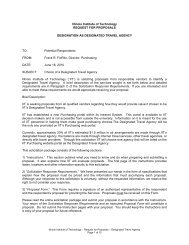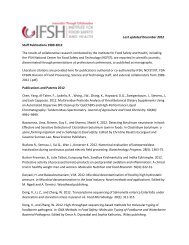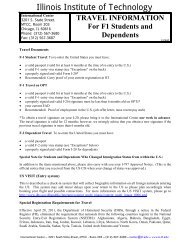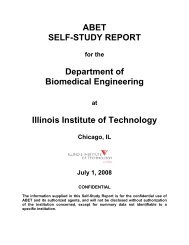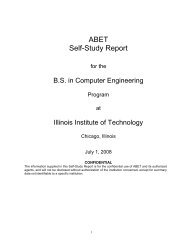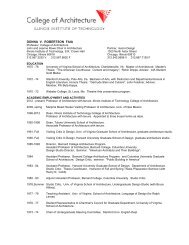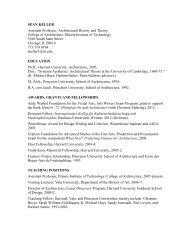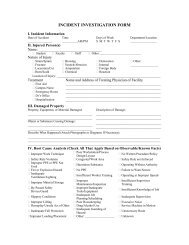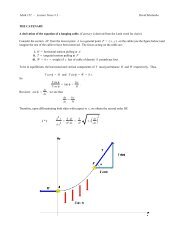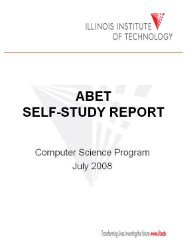Copyright & Disclaimer Information - Illinois Institute of Technology
Copyright & Disclaimer Information - Illinois Institute of Technology
Copyright & Disclaimer Information - Illinois Institute of Technology
You also want an ePaper? Increase the reach of your titles
YUMPU automatically turns print PDFs into web optimized ePapers that Google loves.
212<br />
Course Descriptions<br />
Prerequisite: Nine credit hours <strong>of</strong><br />
psychology or consent <strong>of</strong> instructor.<br />
(3-0-3) (S)<br />
PSYC 449<br />
Practicum in Rehabilitation Services<br />
Seminar and supervised fieldwork<br />
experience in a rehabilitation setting<br />
with disabled individuals.<br />
Emphasizes service delivery, interviewing<br />
techniques, and caseload<br />
management. Prerequisites: SOC 480,<br />
PSYC 410, PSYC 411, and PSYC 412<br />
or concurrent registration. (3-0-3)<br />
PSYC 452<br />
Personality Theory<br />
Survey <strong>of</strong> personality theories and<br />
their application to everyday life.<br />
Prerequisites: PSYC 221, PSYC 222.<br />
(3-0-3) (S)<br />
PSYC 455<br />
Development and Evaluation <strong>of</strong> Training<br />
Organizations<br />
The goal <strong>of</strong> this course is to provide<br />
the learner with a systems perspective<br />
to training in organizations.<br />
Through readings, discussions, in<br />
class exercises and project work students<br />
will learn to identify organizational<br />
issues that can be solved using<br />
a training intervention and develop<br />
appropriate training. The focus <strong>of</strong> the<br />
course will primarily be on knowledge<br />
application. Students will learn<br />
about the various steps involved in<br />
designing a training program including<br />
needs assessment, influence <strong>of</strong><br />
learner characteristics, transfer <strong>of</strong><br />
training and training evaluation.<br />
Through project work students will<br />
gain skills in implementing these<br />
steps. Prerequisite: PSYC 221 or<br />
PSYC 301. (3-0-3)<br />
PSYC 456<br />
Engineering Psychology<br />
Theory <strong>of</strong> human physical and psychological<br />
abilities as they relate to<br />
design <strong>of</strong> transportation, housing,<br />
workplace, defense and recreational<br />
systems. Topics include theories relating<br />
to psychophysiology, anthropometry,<br />
communications, man-machine<br />
interactions, training, maintainability,<br />
safety and engineering evaluation.<br />
Prerequisites: PSYC 221, PSYC 222.<br />
(3-0-3) (S)<br />
<strong>Copyright</strong> & <strong>Disclaimer</strong> <strong>Information</strong>: <strong>Copyright</strong> © 1994, 1995, 1996, 1997, 1998, 1999, 2000, 2001, 2002, 2003, 2004, 2005, 2006, 2007. CollegeSource®, Inc. and Career Guidance Foundation. CollegeSource® digital catalogs are derivative works owned and copyrighted by CollegeSource®, Inc. and Career Guidance Foundation. Catalog content is owned and copyrighted by the appropriate school. While CollegeSource®, Inc. and Career Guidance Foundation provides information as a service to the public, copyright is retained on all digital catalogs.<br />
<strong>Copyright</strong> & <strong>Disclaimer</strong> <strong>Information</strong>: <strong>Copyright</strong> © 1994, 1995, 1996, 1997, 1998, 1999, 2000, 2001, 2002, 2003, 2004, 2005, 2006, 2007. CollegeSource®, Inc. and Career Guidance Foundation. CollegeSource® digital catalogs are derivative works owned and copyrighted by CollegeSource®, Inc. and Career Guidance Foundation. Catalog content is owned and copyrighted by the appropriate school. While CollegeSource®, Inc. and Career Guidance Foundation provides information as a service to the public, copyright is retained on all digital catalogs.<br />
PSYC 481<br />
Group & Leadership at Work<br />
The course will review a system<br />
model <strong>of</strong> groups and will discuss<br />
developmental stages <strong>of</strong> groups as<br />
they relate to communication behaviors.<br />
It will also review various<br />
approaches to leadership including<br />
individual, contingency, and relationship.<br />
The course engages students in<br />
various activities to help them<br />
become aware <strong>of</strong> themselves as team<br />
members and team leaders.<br />
Prerequisites: PSYC 221 and PSYC<br />
301. (3-0-3) (S)<br />
PSYC 482, 483<br />
Undergraduate Research Seminar I, II<br />
An introduction to applied research in<br />
psychology. Includes a didactic review<br />
<strong>of</strong> basic and current issues in psychological<br />
research as well as an experiential<br />
component. Students actively<br />
participate in ongoing faculty research<br />
programs and are exposed to all areas<br />
<strong>of</strong> research. Prerequisites: PSYC 221,<br />
PSYC 222 and PSYC 204; or consent<br />
<strong>of</strong> instructor. (1-2-3)<br />
PSYC 487<br />
Integrative Psychology Seminar I<br />
A synthesis <strong>of</strong> issues and areas in<br />
psychology. Prerequisites: Junior<br />
standing, 21 credit hours in psychology,<br />
and PSYC 203. (3-0-3)<br />
PSYC 488<br />
Integrative Psychology Seminar II<br />
Seminar integrating seminal and cutting<br />
edge psychological writings both<br />
empirical and conceptual to address<br />
key issues in contemporary psychology.<br />
Prerequisites: Junior year standing,<br />
24 credit hours in psychology. (3-0-3)<br />
PSYC 489<br />
Undergraduate Psychology Seminar<br />
Reports and discussion <strong>of</strong> current<br />
problems and issues in psycho logy.<br />
Prerequisites: PSYC 221, PSYC 222<br />
and PSYC 204; or instructor’s consent.<br />
(3-0-3) (S)<br />
PSYC 497<br />
Special Problems<br />
Independent study involving compilation<br />
and analysis <strong>of</strong> data bearing on a<br />
significant problem. Prerequisites:<br />
Junior standing and consent <strong>of</strong> instructor.<br />
(Credit: Variable)<br />
IIT Undergraduate Bulletin 2006–2008<br />
Graduate Courses<br />
The following graduate courses are<br />
available to degree-seeking undergraduate<br />
students with the approval <strong>of</strong> the<br />
course instructor and faculty adviser.<br />
See the current IIT Bulletin: Graduate<br />
Programs for course descriptions.<br />
PSYC 501<br />
Psychological Foundation<br />
<strong>of</strong> Behavior<br />
PSYC 502<br />
Social Bases <strong>of</strong> Behavior<br />
PSYC 503<br />
Learning, Cognition and Motivation<br />
PSYC 504<br />
Individual and Cultural Differences<br />
PSYC 513<br />
Assessment in Rehabilitation Counseling<br />
PSYC 523<br />
Introduction to<br />
Theories <strong>of</strong> Psychology<br />
PSYC 529<br />
Personnel Selection and<br />
Evaluation<br />
PSYC 545<br />
Graduate Statistics<br />
PSYC 556<br />
Organizational Psychology<br />
PSYC 557<br />
Pre-practicum in Rehabilitation Counseling<br />
PSYC 561<br />
Applied Counseling Techniques<br />
PSYC 562<br />
Job Placement<br />
PSYC 563<br />
Human Growth and Career Development<br />
PSYC 583<br />
Rehabilitation Engineering <strong>Technology</strong><br />
PSYC 590<br />
Introduction to Psychiatric Rehabilitation



